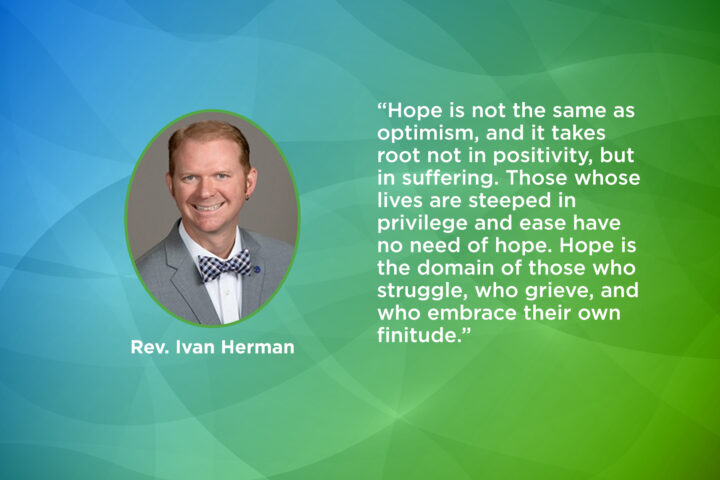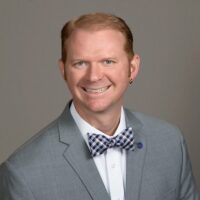11/29/2023
Examining the roots of hope in Advent
by Rev. Ivan Herman

It always took at least a half an hour to say goodbye to my Aunt Bonnie. The goodbyes would start on the living room couch, move to the entryway, the screened-in porch, the short brick wall overlooking the backyard, then to the concrete parking pad. “I don’t want you to die of thirst out there!” she’d say. “I have a few bottles of iced tea you can take with you.” “You’ll catch your death of cold; there’s a spare wool cap I found on sale in the closet. Let me get it for you.” After five minutes standing at the car door getting directions to get us to our destination five minutes sooner, we’d back out slowly. Her traditional adieu, “Y’all be careful!” followed us down the driveway.
“Y’all be careful!” must run in the family. My kids sometimes poke fun at me for being an overly dramatic worrywart. They claim my favorite phrase is, “…and then you’ll die!” As in, “If you don’t wash your hands for dinner, then you’ll get sick…” I regularly remind my son as he leaves for school on his bike that his superpower is invisibility (because drivers never see cyclists), and that parking lots are always the most dangerous place on the road. If my spouse is next to me, we wave and call out like Miracle Max in The Princess Bride, “Have fun storming the castle!” “Think it’ll work?” “It would take a miracle.” “Buh-bye!”
I expect this anxious ability to anticipate the worst outcome (or that any good outcome would take a miracle) isn’t unique to me or my family. Maybe it is a reaction to the optimism that infects our American culture. This optimism is so pervasive that we are blind to its toxicity. We tell tall tales of bootstraps and achieving the American Dream after having “arrived with just one dollar in a pocket.” While it might have happened to someone, it has never been the norm, nor will it ever be. Our culture of toxic positivity encourages us to tells those who are grieving to “look on the bright side,” those who are depressed to “just cheer up,” and those who are discriminated against to “smile more.” This same culture continues to lie to itself believing that peace is obtainable with more guns and more prisons, technology is a way to salvation, economic growth is infinite, and death is optional. (Have you made/updated your will? Come on, be honest!) As if!
Perhaps the Apostle Paul was on to a better way when he says in Romans 5:3-5 “… we also boast in our sufferings, knowing that suffering produces endurance, and endurance produces character, and character produces hope, and hope does not disappoint us, because God’s love has been poured into our hearts through the Holy Spirit that has been given to us.”
Hope is a heck-of-a-lot better outcome to distress than the anxiety, pessimism, or the snarky-ness endemic to my generation—okay, all our generations! Hope is not the same as optimism, and it takes root not in positivity, but in suffering. Those whose lives are steeped in privilege and ease have no need of hope. Hope is the domain of those who struggle, who grieve, and who embrace their own finitude.
As your pastoring journey takes you through this season of Advent, I invite you to not fear your suffering and to embrace those around you who are suffering. When cancer strikes instead of saying, “I can’t imagine what you’re going through,” try imagining it! Sure, it will be difficult to imagine, but you can do it! Fear may flow from that experience, but so will hope, simply from the solidarity in your act of imagination. Open your ministry to those who are hurting and on the margins of your community. Invite an unhoused member of your community to light the candle of hope, a war refugee to light the candle of peace, someone who is receiving treatment for depression to light the candle of joy, or a domestic violence survivor to light the candle of love. Look to those who may create an opportunity to witness how suffering is converted into hope through the catalyst of God’s love.
Aunt Bonnie would wring her hands and fuss over the little things like iced tea, wool caps, and driving directions, but a prolonged, anxious farewell was her way of showing she cared. It was her way of saying, “I love you.”
So, dear colleagues, “Y’all be careful!”

